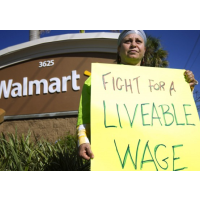Are Taxpayer Subsidies Allowing Big Business to Underpay Employees?
 (photo: J Pat Carter, AP)
(photo: J Pat Carter, AP)
Anti-poverty programs intended to help struggling Americans survive have inadvertently become a means of providing subsidies to many large U.S. corporations, propping up their low-wage schemes that force employees to seek out government support.
A new study released on Monday by the Berkeley Center for Labor Research and Education at the University of California found nearly 75% of those receiving public assistance are part of a family led by someone who is employed.
But in many cases, the employer is a company like McDonald’s, Walmart or others that pay minimum wage or something close to it that isn’t enough to live on. Consequently,
these workers must turn to Medicaid, food stamps (SNAP), Temporary Assistance for Needy Families, and the Earned Income Tax Credit—programs that consume more than $150 billion a year in state and federal funding.
“This is a hidden cost of low-wage work,” Ken Jacobs, chairman of the Berkeley center and a co-author of the report, told The New York Times.
When corporations continuously underpay their workers, the government must step in to keep low-income individuals from slipping even further into poverty. Meanwhile, these companies are raking in enormous profits as a result of keeping their labor costs down.
Another report, issued by the Federal Reserve Bank of Cleveland, showed labor’s share of overall income has fallen to record lows in recent years at the same time corporate earnings are booming.
Sarah Leberstein, a senior staff lawyer with the National Employment Law Project, echoed Jacobs’ remarks while testifying before Connecticut lawmakers when she said: “The low-wage business model practiced by many of the largest and most profitable employers in the country not only leaves many working families unable to afford the basics, but also imposes significant costs on the public as a whole.”
Some states have tried to reverse this problem by mandating increases in the minimum wage. Connecticut, though, may try a different approach by demanding in a new bill that large employers pay a fee to the state for each worker who makes less than $15 an hour.
-Noel Brinkerhoff
To Learn More:
Working, but Needing Public Assistance Anyway (by Patricia Cohen, New York Times)
The Public Cost of Low-Wage Jobs in the Banking Industry (by Sylvia A. Allegretto, Ken Jacobs, Dave Graham-Squire and Megan Emiko Scott, UC Berkeley Labor Center)
Fast Food, Poverty Wages: The Public Cost of Low-Wage Jobs in the Fast-Food Industry (by Sylvia A. Allegretto, Marc Doussard, Dave Graham-Squire, Ken Jacobs, Dan Thompson and Jeremy Thompson, UC Berkeley Labor Center)
Low-Income Working Families: The Racial/Ethnic Divide (by Deborah Povich, Brandon Roberts and Mark Mather, The Working Poor Families Project) (pdf)
Rep. McClintock Argues Minimum Wage Needs to be Low for “Minorities” (by Ken Broder, AllGov California)
If a High Minimum Wage Kills Jobs, How Do You Explain San Francisco? (by Ken Broder, AllGov California)
- Top Stories
- Unusual News
- Where is the Money Going?
- Controversies
- U.S. and the World
- Appointments and Resignations
- Latest News
- Trump Orders ICE and Border Patrol to Kill More Protestors
- Trump Renames National Football League National Trump League
- Trump to Stop Deportations If…
- Trump Denounces World Series
- What If China Invaded the United States?






Comments